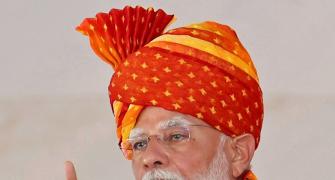'Savings help you meet immediate needs like hospitalisation, vacation, etc.'
'Investment is to multiply your savings for long term goals like children's education and retirement when the goals are 7 to 15 years away.'

On October 30, World Savings Day, Scripbox, an online investment service company released the results of a survey it had conducted on women and the way they handle money.
According to the survey, women were 'recklessly' cautious with their savings.
Nearly 58% of the women who participated in the survey preferred to save their money through fixed deposits, PPF or 'letting it lie in their savings account.'
6% women said they preferred to buy gold while 15% picked mutual funds to invest their excess income.
"80% of millennials are very disciplined about savings. Because they want to progress faster in a shorter time, they work twice as hard as a non-millennial. It is like they want to achieve everything by the time they turn 30!", Ashok Kumar E R, CEO and co-founder, Scripbox, tells Rediff.com's Shobha Warrier.
Any particular reason why you decided to do a survey on the way women save?
All our mothers are very good at budgeting and expense management. But most women think their husbands or sons or fathers have to manage their money even though women are very good at managing money.
For whatever reason, money management is considered as a man's topic.
Our platform basically simplifies all the investment issues.
In the last seven years that we have been in existence, we have found that 28% of our customers are women. Because we have been simplifying investment ideas, women are adopting our products a lot more than men.
This is what prompted us to do a survey to understand the way women handle money, and a little more; like their relationship with money, how they save and invest, etc.
Did the survey come up with any surprises?
I would say the survey validated our assumptions.
One is that women are more disciplined while handling money than men. And we found that 80% of the women are disciplined about their savings.
The other stereotype assumption is that women are more cautious than men in matters concerning money. And we found that it was true. Because of this cautious approach, they prefer bank accounts and fixed deposits.
Another assumption is that they avoid any kind of risk as far as money is concerned. This also got validated.
We found that women are open to seek professional help to educate themselves before taking a decision.
We also found that 44% of women are unsure about their financial approach, but they welcome any additional help. The fact that almost 50% women are unsure about their approach to money, was a bit of a surprise to us.
We understood that there was a kind of unrest in their minds regarding the future like children's education, retirement, etc. as expenses keep going up. And, they are not sure whether fixed deposits or investment in gold will help them tide over this.
Indians are great savers. Fixed deposits, real estate and gold are the three kinds of savings Indians have used for many generations.
Your survey results say, women are 'recklessly' cautious. What do you mean by 'recklessly cautious'?
The word reckless came from the fact that a very high percentage of women tend to move so cautiously, to such a level that they are not able to meet their future goals.
The word came out as part of the survey output.
For example, though 80% of the women are disciplined about savings, they put their money in an instrument that does not beat inflation.
It is like you are on a treadmill where you have to increase the speed to catch up to stop yourself from falling.
But once you educate them on the possibilities, they are ready to take different decisions. Some of our customers wrote to us that they didn't know why they were so overcautious for so many years!
In general, are women averse to taking risks as far as money is concerned?
The answer is, yes. But that is because of poor awareness.
They are not willing to take any risk because of lack of awareness of the possibilities. But when you show them the data that equity and mutual funds are good when they are investing for a 7 to 8 year horizon, they are open to the suggestion.
They are willing to change their perception of risk, that the risk is higher when they do not invest in the market if the goal is long term.
Do they generally prefer FD or PPF to mutual funds?
Yes. But that is because of the perception they have of risk. I think lack of awareness and education seem to be the biggest gap.
You mean women are less informed about the possibilities than men?
Absolutely. Some of our customers told us, 'At least now, I realise that I need to take control of my finances.' The words 'my finances' is very interesting, we felt.
 IMAGE: Ashok Kumar E R is the CEO and co-founder of Scripbox, a financial advisory firm.
IMAGE: Ashok Kumar E R is the CEO and co-founder of Scripbox, a financial advisory firm.Do you think women prefer saving than investing?
Absolutely right. In India, saving and investing are used interchangeably.
The fact is, savings help you meet immediate needs like hospitalisation, vacation, etc.
On the other hand, investment is to multiply your savings for long term goals like children's education and retirement when the goals are 7 to 15 years away.
And for long term goals, you have to invest and not save.
Many women think that FD is an investment. The inflation compounding awareness is very poor.
You have categorised women as 'millennial and non-millennial'. Is there any difference in the way they think?
Because we are an online, Internet-based company, we can segment the age group also. So, instead of giving out the age group, we thought it would be better to categorise them as millennial and non-millennial.
We wanted to know whether there is any distinct pattern. Yes, the percentage of working women are higher in the millennial group.
One difference we found is that non-millennial women are used to certain savings pattern for perhaps a decade and it is difficult to change after a certain age.
On the other hand, the millennial women are more open as they are starting out in their lives. We found that receptiveness of a millennial to new ideas is higher than the non-millennial.
The general perception is that millennial women more interested in spending rather than saving. Is it true?
I would say, 80% of them are very disciplined about savings.
Spending is more of a stereotypical image.
Contrary to the perception, millennials are far more hardworking. Because they want to progress faster in a shorter time, they work twice as hard as a non-millennial.
It is like they want to achieve everything by the time they turn 30!
Are women good with money?
Absolutely yes, except for their saving pattern.








